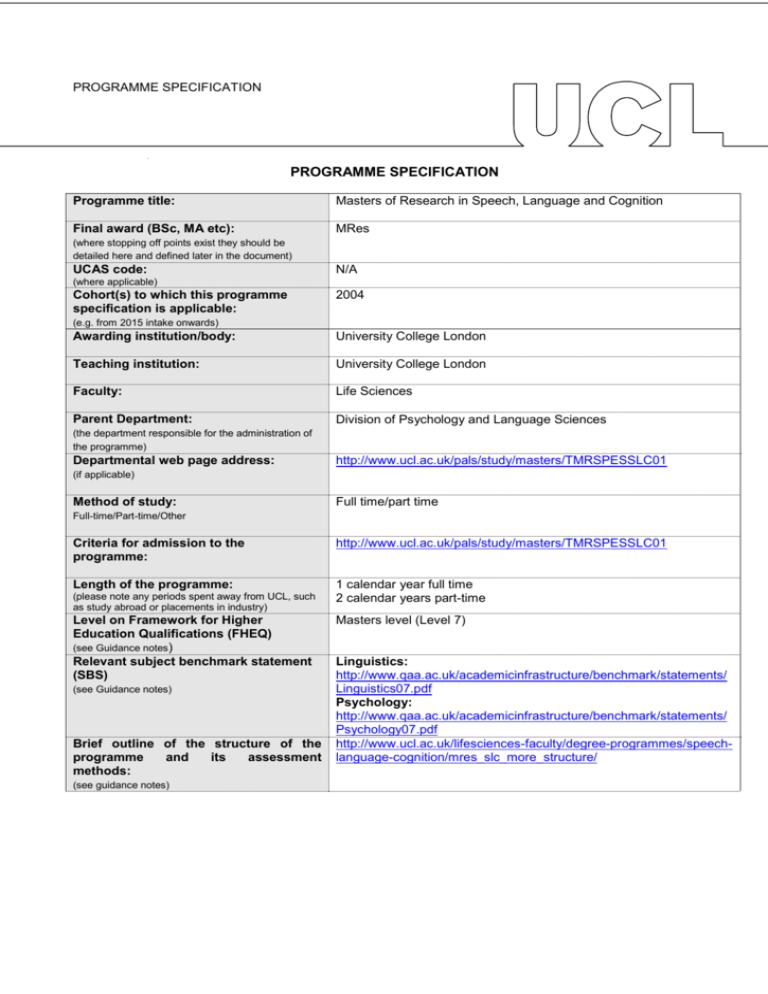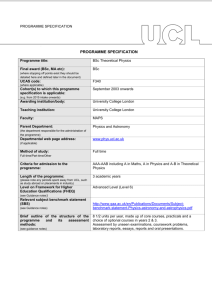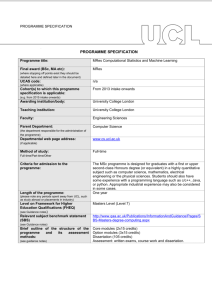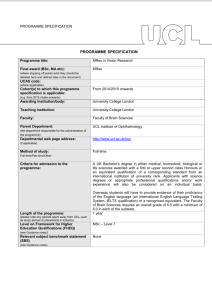MRes Speech, Language and Cognition
advertisement

PROGRAMME SPECIFICATION PROGRAMME SPECIFICATION Programme title: Masters of Research in Speech, Language and Cognition Final award (BSc, MA etc): MRes (where stopping off points exist they should be detailed here and defined later in the document) UCAS code: N/A (where applicable) Cohort(s) to which this programme specification is applicable: 2004 (e.g. from 2015 intake onwards) Awarding institution/body: University College London Teaching institution: University College London Faculty: Life Sciences Parent Department: Division of Psychology and Language Sciences (the department responsible for the administration of the programme) Departmental web page address: http://www.ucl.ac.uk/pals/study/masters/TMRSPESSLC01 (if applicable) Method of study: Full time/part time Full-time/Part-time/Other Criteria for admission to the programme: http://www.ucl.ac.uk/pals/study/masters/TMRSPESSLC01 Length of the programme: 1 calendar year full time 2 calendar years part-time (please note any periods spent away from UCL, such as study abroad or placements in industry) Level on Framework for Higher Education Qualifications (FHEQ) (see Guidance notes) Relevant subject benchmark statement (SBS) (see Guidance notes) Brief outline of the structure of the programme and its assessment methods: (see guidance notes) Masters level (Level 7) Linguistics: http://www.qaa.ac.uk/academicinfrastructure/benchmark/statements/ Linguistics07.pdf Psychology: http://www.qaa.ac.uk/academicinfrastructure/benchmark/statements/ Psychology07.pdf http://www.ucl.ac.uk/lifesciences-faculty/degree-programmes/speechlanguage-cognition/mres_slc_more_structure/ Board of Examiners: Name of Board of Examiners: MSc Language Sciences & MRes Speech, Language and Cognition Professional body accreditation (if applicable): N/A Date of next scheduled accreditation visit: EDUCATIONAL AIMS OF THE PROGRAMME: The aims : To introduce students to academic and key skills essential for all fields of research in Speech, Language and Cognition To provide research training, with relevant supervisors from the Centre for Human Communication. To enable students to assess and critically appraise theoretical and applied research relevant to speech, language and cognition For suitable students, this MRes may also form the basis of a 1+3 or 4 year PhD programme in one of the contributing departments. PROGRAMME OUTCOMES: The programme provides opportunities for students to develop and demonstrate knowledge and understanding, qualities, skills and other attributes in the following areas: A: Knowledge and understanding Knowledge and understanding of: the theoretical foundations underlying the processes of human communication currently relevant research in speech, language and cognition how to formu late research questions and devise a research methodology a range of quantitative and qualitative methodilogy appropriate to the topic of research Teaching/learning methods and strategies: Small group teaching, seminars, student–led research tutorials, self-study materials, supervised laboratory placement . Students are encouraged to take responsibility for their own learning and to undertake independent, reading to broaden their knowledge and understanding across the range of topics taught and to critically evaluate this literature Assessment: Students are assessed by: ‘unseen’ examination, essays, PhD plan (includes an extensive literature review), research report. B: Skills and other attributes Intellectual (thinking) skills: a) Critically evaluate research findings and theoretical frameworks. b) Apply theoretical understanding to research methodology c) Use reasoning skills to generate hypotheses, propose arguments and provide rationale d) Identify and solve research problems e) Understand ethical research and the application of ethics to the conduct of research. Practical skills (able to): a) Transcribe and analyse speech, language and cognitive data at an appropriate level for the research question, eliciting data from subjects sensitively and appropriately b) Undertake and interpret statistical analyses of data. c) Manage a research project at all stages, including application to ethics committees Teaching/learning methods and strategies: a) The supervised research project and PhD plan includes critical evaluation of relevant literature. Seminars and critical analysis sessions encourage critical reading and evaluation of research papers; Discussion of key issues in teaching sessions promotes evaluation of theories; Feedback on essays. b) Teaching in seminars relates theory to methodology and encourages students to develop a robust theoretical rationale for the research project and PhD plan; supervised laboratory placement work. c) Reasoning skills are promoted in seminar teaching, in analysing research papers, and in developing ideas for research projects. d) Critical analysis sessions focus on identifying and resolving ‘problems’ encountered in research papers, with peer support e) Throughout the course, students will be asked to reflect on the ethics of research and in both the research project and PhD plan, will be required to justify their choice of research question. f) The “Issues and Methods in the Conduct of Research” (IMR) part of the PPSRP has a strong focus on these skills. Assessment: a) In essays, project and PhD plan, marks are awarded for critical evaluation and reasoning. b) Essays, Project and research plan. c) Project and PhD plan d) Project e) Project and PhD plan C: Skills and other attributes Teaching/learning methods and strategies: a) Practical classes, exercises and Summer laboratory placement. b) Lectures and computer-based practical classes. c) Research seminars, student led tutorials, supervised laboratory placement. d) The “Personal and Professional Management Skills” (PPMS) module of the PPSRP has a strong focus on these skills. Assessment: a) Practical exercises b) Computer-based tasks c) Research project and PhD plan. D: Skills and other attributes Transferable skills (able to): a) Communicate effectively in writing and oral presentations b) Listen, give and receive feedback and respond appropriately c) Manage & facilitate group discussions d) Identify own training needs Teaching/learning methods and strategies: a) Presentations, essays, supervised research project and PhD plan b Critical analysis sessions, research presentations c) Chairing project presentations d) Laboratory placement Assessment: Research project and PhD plan which include project presentation. The following reference points were used in designing the programme: the Framework for Higher Education Qualifications: (http://www.qaa.ac.uk/en/Publications/Documents/Framework-Higher-Education-Qualifications-08.pdf); the relevant Subject Benchmark Statements: (http://www.qaa.ac.uk/assuring-standards-and-quality/the-quality-code/subject-benchmark-statements); the programme specifications for UCL degree programmes in relevant subjects (where applicable); UCL teaching and learning policies; staff research. Please note: This specification provides a concise summary of the main features of the programme and the learning outcomes that a typical student might reasonably be expected to achieve and demonstrate if he/she takes full advantage of the learning opportunities that are provided. Current students can find more detailed information on the learning outcomes, content and teaching, learning and assessment methods of each course unit/module at http://moodle.ucl.ac.uk/course/view.php?id=1998. The accuracy of the information contained in this document is reviewed annually by UCL and may be checked by the Quality Assurance Agency. Programme Organiser(s) Dr Bronwen Evans Name(s): Date of Production: October 2014 Date of Review: October 2014 Date approved by Head of Department: October 2014 Date approved by Chair of Departmental Teaching Committee: Date approved by Faculty Teaching Committee October 2014 November 2014






